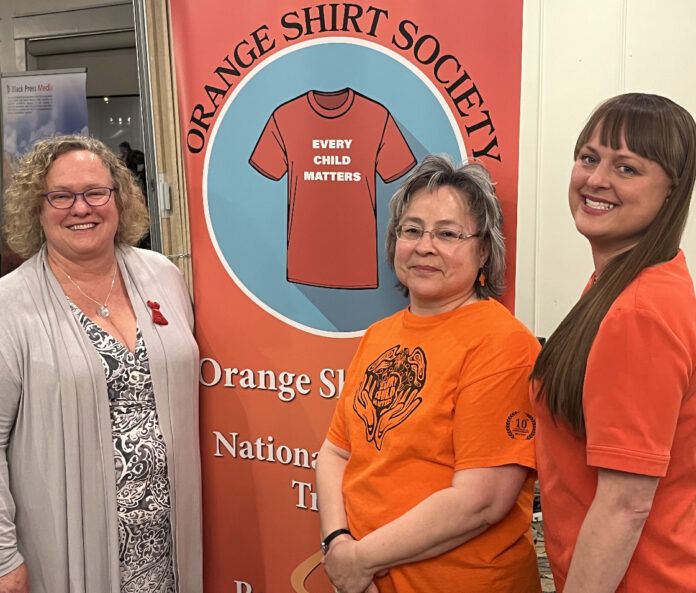A banquet hall full of people on the edge of their seats gathered in Nelson to hear the story of the woman who created Orange Shirt Day, and helped instate the public holiday we know as National Day of Truth and Reconciliation.
Phyllis Webstad, 55, was born in Dog Creek and currently lives in Williams Lake. She arrived in Nelson to tell her story surrounding the journey she took to bring awareness to truth and reconciliation.
Webstad, who spoke Thursday at the Prestige in Nelson as part of the Find Your Divine event, wore an orange shirt in tribute to the one her grandmother gifted her when she attended her first day at St. Joseph’s Mission Residential school, where she was forced to remove it. She protested the unfair treatment but despite her efforts the shirt was forcibly removed and never returned to her.
Webstad says the orange shirt is symbolic to truth and reconciliation and also means inclusion and allowing people to have their voices heard.
“We wanted everyone to know people were welcome to tell their survival story,” she says. “They were welcome to attend everything we were planning, anywhere it happened.”
She adds it was hard to get the movement off the ground, but after persistence and dedication it proved to be worthwhile.
“It didn’t work at first, so I was chosen as a survivor from our planning group,” Webstad says. “I went to media events to let people know what was happening.
“This is when I told my story.”
According to Webstad there were a lot of reasons they chose to have the national holiday on Sept. 30, and it wasn’t arbitrarily chosen.
She says it was chosen because it reflects the history of events which took place.
“We chose September because that is the time of year people were taken from their homes and families,” she says. “We then needed a day, so we chose the 30th to give teachers and students to time to settle in.
“At the time it was just for the Mission, and to have a conversation, at least once a year.”
Webstad say with 2023 being tenth anniversary of Orange Shirt Day she is thrilled at how much change is happening.
“It has been really hard,” she says. “But to see all these people and have them come up and acknowledge the change that is happening gives me that little bit of energy to keep going.”
She says the past has been rough, but the future looks bright for the Orange Shirt Society.
“We have the society, and we are concentrating on putting a foundation under it, so that will continue on into the future,” she says. “I am thinking I have about another 20 years left to participate, so beyond that I am not sure what the future looks like.”
Webstad says she is planning to bring her story forward in an audio format so she can keep the movement alive and prospering.
“I am presently working on recording my story, which will be 45 minutes in length,” she says. “This way I can join in for the last 15-20 minutes to meet people and answer questions.”
She says providing awareness, and education, around truth and reconciliation now is critical because eventually the story will fade.
“Orange Shirt Day is here to stay, along with National Truth and Reconciliation day,” she says. “One day there will be no survivors left in Canada, but there will be days to commemorate it.”





